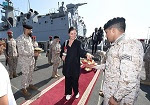European energy firms can open special accounts with
Gazprombank to pay for Russian gas, a key demand by Moscow, without breaching
sanctions if transferring euros or dollars to them fulfils their contractual
obligations, the German Economy Ministry said.
Russia cut gas supplies to Bulgaria and Poland this week for
failing to pay in roubles, raising fears that other countries could be next.
Moscow's decree says Gazprombank would open special
"K" type accounts for gas payments from foreign buyers. An EU company
would transfer foreign currency into one such account, and then a Russian bank
would convert the payment to roubles and transfer the roubles to another
"K" account belonging to Gazprom.
European Union countries remain divided over whether
sanctions would be broken if they engage with Russia's roubles payment demand.
Russia's decree said the buyer's obligation would be
considered fulfilled only when the roubles arrived in Gazprom's account.
"There are European guidelines on payment modalities,
which form the framework for us and which we adhere to," a spokesperson
for Germany's Economy Ministry said on Friday in an e-mailed statement.
"According to these guidelines, account K, to which
payment is made in euros/dollars, is in line with the sanctions if companies
declare that contracts have been fulfilled with payment in euros or
dollars."
A government source said that it was irrelevant in which
country the K account is opened as long as the bank in question was not on any
sanctions list.
The European Commission will provide EU countries with extra
guidance on whether they can keep paying for Russian gas without breaching the
bloc's sanctions, a Commission official told Reuters on Friday.
Companies and countries were at odds over Moscow's
rouble-for-gas payment system on Friday, while European officials promised more
guidance on whether buying Russian gas can comply with sanctions and Russia
said it saw no problem with its plan.
It did not specify whether companies could do this and also
open a rouble account, as requested by Russia, without being in breach of EU
sanctions.
Denmark's Orsted said it has no intention of opening a
rouble account in Russia, although it declined to comment on payment in other
currencies. Italy's ENI also said it had not opened an account in roubles.
Under Russia's mechanism, buyers are obliged to deposit
euros or dollars into an account at privately-owned Russian bank Gazprombank,
which has then to convert them into roubles, place the proceeds in another
account owned by the foreign buyer and transfer the payment in Russian currency
to Gazprom.
EU energy ministers will on Monday hold an emergency meeting
to discuss their response to Russia's demand.
The European Commission, the EU executive, has already said
countries may be able to make sanctions-compliant payments provided they
declare their payments are completed once it has been made in euros and before
it is converted into roubles.
EU countries, however, have said they want more clarity,
while Germany, the bloc's biggest economy and among the most dependent on
Russian gas, says it cannot afford to stop buying Russian supplies, even though
it is taking steps to find alternative sources of energy.
A European Commission official told Reuters on Friday the
executive will provide EU countries with extra guidance following complaints
from some countries that ambiguity would leave different countries reaching
different interpretations of what they were allowed to do.
Russia on Friday said it saw no problem with its proposed
system.
"If the established procedure for interaction between
gas buyers and the authorized bank is observed by the buyer, and there are no
problems for the authorized bank in terms of selling currency on the stock
exchange due to restrictive measures on the part of foreign states, then there
cannot be any obstacles to paying for and receiving natural gas," Russian
Central Bank Governor Elvira Nabiullina said.
The rouble has to an extent benefited from Moscow's demand
for roubles payment. The currency hit its highest level versus the euro in more
than two years on Friday supported by capital controls as the central bank cut
interest rates for the second time this month.
European gas prices have hit record levels since the
invasion of Ukraine by Russia, Europe's top gas supplier, and were up slightly
on Friday.
Central to the confusion on the part of the European buyers
is whether Russia would only consider the payment to be complete after the
gas-to-roubles conversion is done - a transaction that would involve Russia's
central bank, which is subject to EU sanctions.
Speaking on condition of anonymity, an EU diplomat admitted
a certain amount of ambiguity could be helpful as the bloc seeks to prevent any
widening of divisions between countries, which have different levels of reliance
on Russia and different deadlines to make payments.
"In the circumstances, a little bit of messiness might
just be preferable," the diplomat said.
Poland and Bulgaria have contracts with Gazprom due to
expire at the end of this year, which meant their search for alternative
supplies was already advanced. Poland also has very healthy gas stocks around
77% full.
Austria’s OMV, which has a contract with Gazprom until 2040,
said it was analyzing how a change could be implemented for it to pay in
roubles without breaching sanctions when next payment is due in May.




